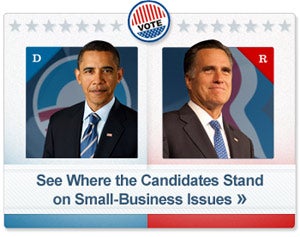Entrepreneur Becomes Lightning Rod in ‘We Built It’ Debate
Opinions expressed by Entrepreneur contributors are their own.
 This week, Delaware entrepreneur Sher Valenzuela landed squarely in the crosshairs of a fierce political argument over how much government is responsible for the growth of small businesses.
This week, Delaware entrepreneur Sher Valenzuela landed squarely in the crosshairs of a fierce political argument over how much government is responsible for the growth of small businesses.
Valenzuela, along with a handful of other small-business owners, was picked to speak Tuesday at the Republican National Convention on a day where the theme was “We Built It” — a direct dig at President Barack Obama’s now famous “You didn’t build that” comment. But Valenzuela quickly came under fire by a number of media outlets, including Huffington Post and New York Times, for her use of government loans and contracts to grow her soft-material manufacturing business, First State Manufacturing.
In her speech last night, Valenzuela didn’t address the controversy swirling around her. Instead, Valenzuela, who is also currently running for lieutenant governor in Delaware, talked about raising an autistic son, the risks she and her husband took to start their business, which now employs 70 people, and the “all-out assault on free enterprise” that the Obama administration is making.
But the fall-out still continued, including on Twitter, where a number of commenters noted her perceived reliance on government help. @utaustinliberal, a self-desribed political junkie, tweeted: “Ummm….Sher Valenzuela, you didn’t build your small business on your own. Govt. provided loans and tax credits. Stop your BS.” Others disagreed, however. Bethany Mandel tweeted: “Dear @MittRomney: Please consider Sher Valenzuela for a position in your administration. Shockingly effective speech.”
If anything, Valenzuela’s story seems to have renewed the debate over the President’s “You didn’t build that” phrase.
Related: Should the U.S. President Have Business Experience? (Opinion)
Obama made the comment last month in Roanoke, Va., after noting that public investments in roads and bridges allows businesses to thrive. “If you’ve got a business — you didn’t build that,” he said.
Republicans almost immediately jumped on the idea that the President doesn’t understand the individual sacrifices that entrepreneurs make to pursue their dream. Meanwhile, Democrats rebuffed the attacks, saying that the phrase was entirely taken out of context.
In a move to champion their rallying cry — “We Built it” — GOP leaders asked Valenzuela to speak at the convention in Tampa to demonstrate the hard work, sacrifice and risk that are involved in creating a small business. Valenzuela and her husband started their First State Manufacturing in their garage with a single sewing machine in order to make enough income to pay for their son’s care — all of which she talked about in last night’s speech.
Meanwhile, an individual who calls himself “First State Man,” set up a parody website at www.firststatemanufacturing.com, calling attention to the governmental assistance that Valenzuela and her husband have received. He declined to reveal his identity but said in an email exchange with Entrepreneur.com: “Ms. Valenzuela knows full well that the President was referring to the exact types of government services that she has utilized time-and-time again over the years as a socially disadvantaged business.”
Related: Are Small Businesses Being Heard This Election Year?
The Small Business Administration confirmed that First State Manufacturing has indeed received support from the government on several occasions. And the company’s website itself promotes its federal contracting success.
For Valenzuela, becoming a target for a larger, national debate has taken its emotional toll. “She is human,” said Kim Hoey Stevenson, the communications director for Valenzuela’s campaign for Lieutenant Governor.
Valenzuela doesn’t dispute that she received government assistance. “Yes, she took whatever help she could — took help from the government,” Stevenson added. “But in the end, it was a resource. It didn’t build her business.”
Has the government been of any assistance to you as you built your business? Or has it interfered more than helped? Leave a comment below and let us know.
 This week, Delaware entrepreneur Sher Valenzuela landed squarely in the crosshairs of a fierce political argument over how much government is responsible for the growth of small businesses.
This week, Delaware entrepreneur Sher Valenzuela landed squarely in the crosshairs of a fierce political argument over how much government is responsible for the growth of small businesses.
Valenzuela, along with a handful of other small-business owners, was picked to speak Tuesday at the Republican National Convention on a day where the theme was “We Built It” — a direct dig at President Barack Obama’s now famous “You didn’t build that” comment. But Valenzuela quickly came under fire by a number of media outlets, including Huffington Post and New York Times, for her use of government loans and contracts to grow her soft-material manufacturing business, First State Manufacturing.
In her speech last night, Valenzuela didn’t address the controversy swirling around her. Instead, Valenzuela, who is also currently running for lieutenant governor in Delaware, talked about raising an autistic son, the risks she and her husband took to start their business, which now employs 70 people, and the “all-out assault on free enterprise” that the Obama administration is making.





